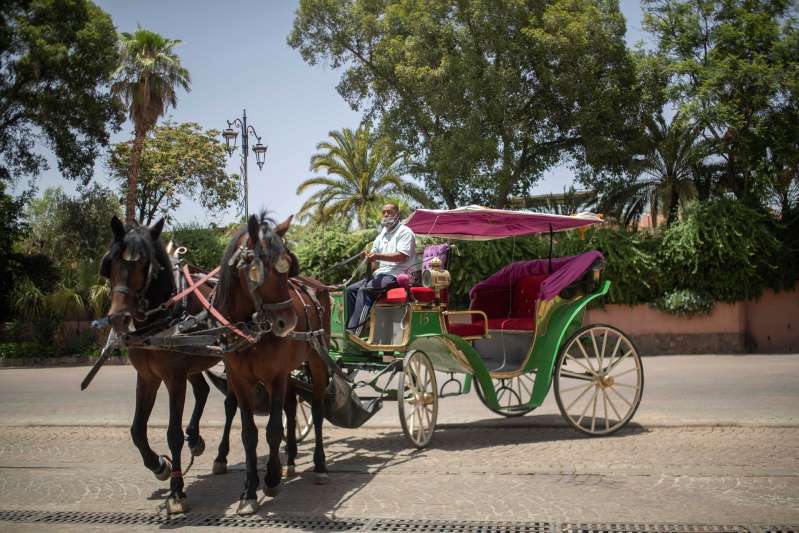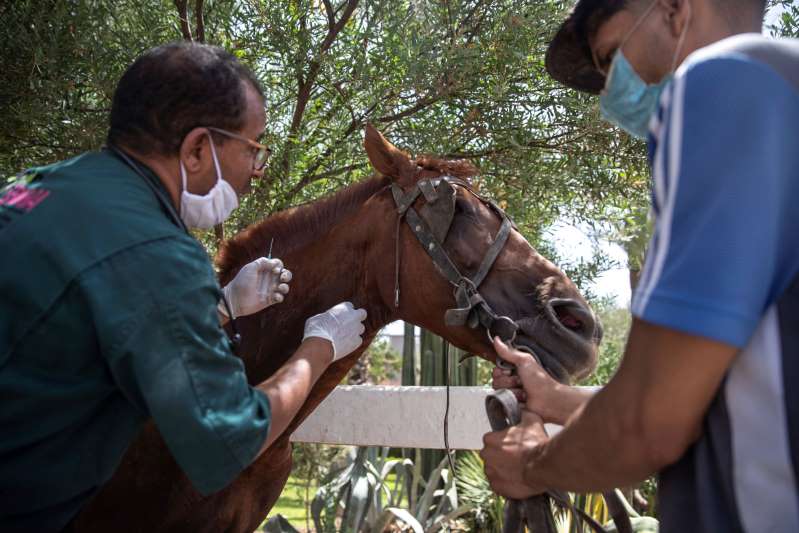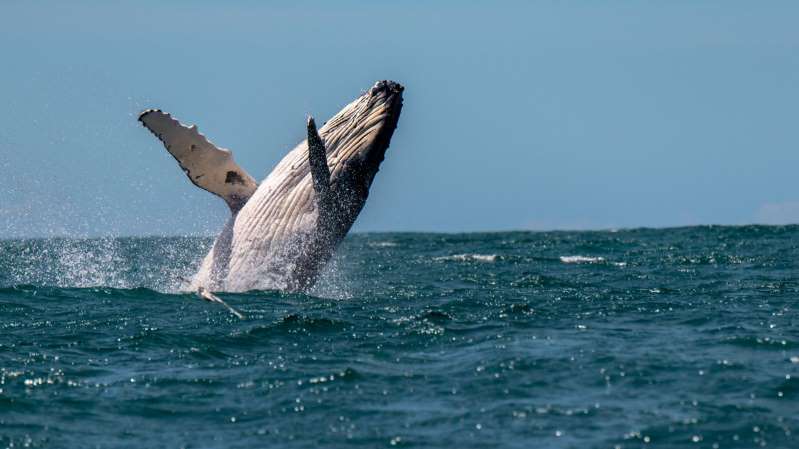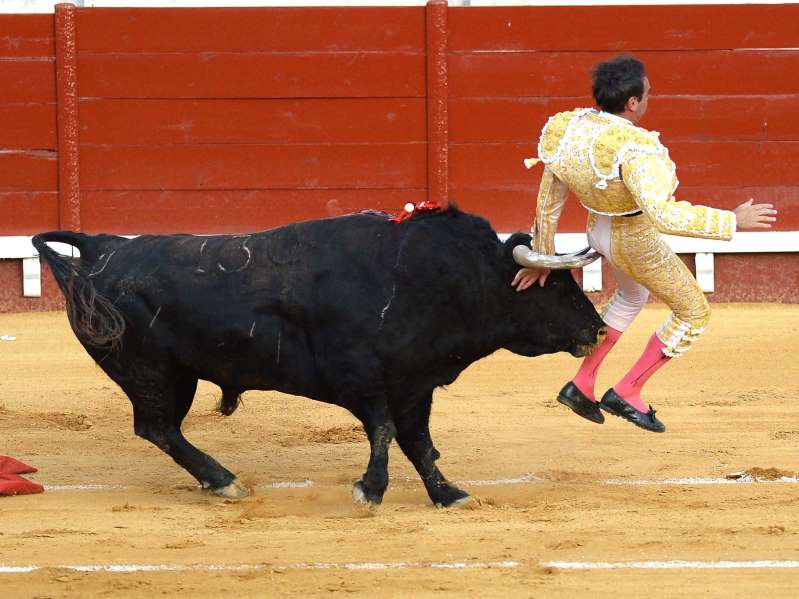This bizarre video show the discovery - of a rare two-headed SNAKE
![]()
![]()
![]()
![]()
![]()
![]()
![]()
This bizarre video show the discovery - of a rare two-headed SNAKE
This bizarre video show the discovery - of a rare two-headed SNAKE. The 11cm-long Russell's viper was found in Maharashtra, India last week (August 6).
The snake, one of the most deadly in the country, was spotted outside a residential building. This video was filmed on August 6th 2020.
Reference: More From Cover Video: 10th August 2020
Starvation looms for Morocco's horses as tourism collapses





Starvation looms for Morocco's horses as tourism collapses
MARRAKECH, Morocco (AP) — Abdenabi Nouidi sold his favorite horse for $150 to help feed the others on the team that pulls tourists in carriages through the buzzing streets of Marrakech, and he is still scared about the future for the others.
The prospect of starvation looms for carriage horses and other animals normally used in Morocco’s tourist mecca., since visitors have vanished during the coronavirus pandemic.
The Society for the Protection of Animals Abroad, or SPANA, says hundreds of Morocco's carriage horses and donkeys are threatened amid the collapsing tourism industry. They are among the estimated 200 million horses, donkeys, camels and elephants worldwide providing various livelihoods for over a half-billion people.

The North African kingdom closed its doors to outsiders after the first virus case was confirmed March 2. It also recently issued a ban on domestic travel to eight cities, including Marrakech.
Thousands of people in the city depend on the carriage horses for their livelihood. A single horse carriage in Marrakech supports four to five families, including owners, drivers and stable boys, driver Abdeljalil Belghaoute said.
He spoke from his carriage, waiting in a line near the famed Jamaa El Fnaa square, hoping that someone would want a ride.
‘If you have a shop, you can close it. If you sell goods, you store them. But imagine having ... horses who need to eat, drink and get medical care,” said Abdeljalil Nouidi.
For two decades, the four Nouidi brothers have taken tourists on sightseeing jaunts in horse-drawn carriages. Now they have empty pockets and mouths to feed, both at home and at the rundown complex outside Marrakech where drivers stable their horses.
The brothers were forced to sell seven of their horses in July. Abdenabi Nouidi's favorite, Cocotte, was among them.
“This is not something I can easily forgive myself for,” he said, recalling a promise he made to Cocotte 15 years ago to keep him forever.
The Nouidi brothers say their horses are visibly nervous and know an abrupt change in their lives may be coming. With no carriage work, the horses’ routine has been disrupted, feed is running low and stablemates are leaving for good.
SPANA helped carriage owners provide the basics for their horses when the COVID-19 pandemic reached Morocco. It delivered three months' worth of feed to almost 600 horses in the city and the neighboring town of Aït Ourir during the country's lockdown.
“It became very clear to us when the lockdown was first imposed that many of Marrakech’s working animals would need our help or face a dire outcome,” said the head veterinarian at SPANA’s Marrakech center, Hassan Lamrini.

The center, in a working-class neighborhood, is a mecca for the city’s thousands of working animals. Since 1988, the team of vets and technicians have cared for donkeys, mules and horses free of charge.
Lamrini said the center has treated an increasing number of cases of colic, an abdominal pain that causes complications in the digestive system, often due to malnutrition. Colic can be fatal.
“There is not much in the world that matters to me more than caring for these animals. They are my entire life,” said Boujamaa Ninich, who has dedicated 50 years to working with SPANA. He spends weeks on end sleeping in a little room at the center to ensure the animals are cared for after dark.
“They give so much to their owners. There is so little that we can give back,’ he said.
Marrakech was nearly at a standstill on a recent visit. The Jamma El Fnaa square, a vast area with hawkers, food vendors and snake-dancers, was nearly deserted.
“Only tourism can save us from this catastrophe we’re facing,” said Belghaoute, the carriage driver hoping for a fare.
The Moroccan government earlier this year launched a social media campaign to encourage citizens to explore their country, but spiking numbers of COVID-19 cases led to the travel ban for eight of the country’s top tourist cities.
Authorities counted 28,500 infections and 435 deaths as of Thursday, but experts say all counts in all countries understate the true toll of the pandemic, due to limited testing, missed mild cases and other factors.
“The longer this goes on, horses and families will struggle to survive. We're really scared by how bad this can get,” Belghaoute said.
Reference: By AMIRA EL MASAITI, Associated Press 1 day ago: 10th August 2020
Humpback whale injures three women in Australia
![]()
![]()
![]()
![]()
![]()
![]()
Humpback whale injures three women in Australia
Three women have been left injured by a humpback whale after swimming in an Australian reef.
According to the Nine Network television station, a 50ft mother whale swam towards a group of snorkelers in the Ningaloo Reef, near the town of Exmouth, last Saturday.
It's thought that the whale became concerned about protecting her calf and thrashed her tail.
A 29-year-old woman was struck by the tail and sustained fractured ribs and internal bleeding.

She was flown to a Perth hospital the next day and remained in a serious but stable condition.
A second swimmer was struck by the same whale's pectoral fin, which tore her hamstring.
Earlier this week, on Thursday, another swimmer, Alicia Ramsay, was snorkelling near the reef when she was approached by the whale and her calf.
She told Nine News: "The calf decided to come check us out ended up being between us and the mum, so mum went into protective mode and swung back.
"As she did that to put herself between us and the calf, her fin came out and got me."
Ms Ramsay is being treated for rib fractures in hospital, newspaper WA Today added.
The Western Australian state government licenses tour operators and sets conditions including keeping swimmers a safe distance from whales that they observe.
The government's Department of Biodiversity, Conservation and Attractions said it was working closely with the industry and the tour operator involved to understand how the incidents occurred.
"Swimming with humpback whales involves some inherent risk," a department statement said.
Reference: Sky News: 9 hrs ago: 8th August 2020
Matador gored in the buttocks after stabbing bull






Matador gored in the buttocks after stabbing bull
A leading Spanish matador has been gored in a bullfight after the animal he stabbed rammed its horns into his buttocks, sending him flying.
When Enrique Ponce, 48, went in for the kill at the El Puerto de Santa Maria stadium, the bull flipped him over, causing him to lie on his front shielding his head.
Despite the scare, the Valencian bullfighter was not seriously injured, with Spanish media reporting only torn knee ligaments and bruising.

The bull was eventually killed, and Mr Ponce went on to slay a second.
The fight saw thousands gather at the historic stadium in Cadiz, Andalusia on the bullring’s 140th anniversary.
Matador seriously injured after being impaled on bull’s horn
It is not the first time Mr Ponce, who is one of the country’s top matadors, has had to deal with a bull fighting back. Last year, a more severe goring left him requiring knee surgery and a 10cm (4 inch) injury to his buttock.
In 2014, while opening the Las Fallas festival in Valencia, a bull broke his collarbone and several of his ribs.
The pandemic appears to have hit the controversial tradition’s popularity, as the first, sparsely attended fight in July after lockdown saw increasing calls for the bloodsport to be banned.
“Have we not already had an overdose of death and pain in these past months?” Carmen Ibarlucea of animal rights group La Tortura No Es Cultura (Torture Is Not Culture) said at the time.
“They return to the bullrings and they mercilessly and tearlessly demand more public money to torture and see a peaceful herbivore dying. Meanwhile we, a social majority, are now calling for a true culture of peace and solidarity.”
A May survey by Electromania showed nearly half of respondents (47 per cent) support a ban, while 18 per cent opposed it and a third were neutral.
Reference: Independent: Clea Skopeliti 11 hrs ago: 8th August

 How to resolve AdBlock issue?
How to resolve AdBlock issue?